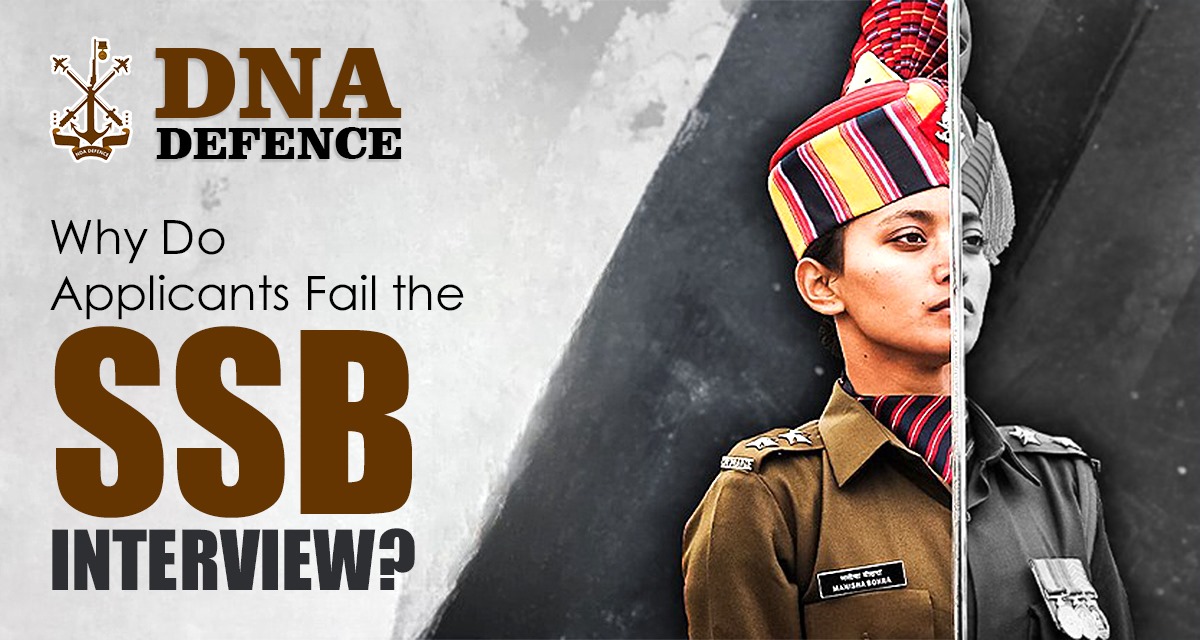Have you ever wondered why some applicants, despite their best efforts, fail to crack the SSB (Services Selection Board) interview?
SSB Interview is an assessment that goes beyond conventional exams; it delves deep into one’s personality, character, and potential as a future leader in the military. It is like a puzzle where the pieces don’t quite fit, leaving candidates perplexed about what went wrong.
Thus in this blog, we’ll unravel some common threads behind SSB interview failures while shedding light on areas where candidates often stumble.
Lack of Preparation
Preparation lays the foundation for success in any task, and the SSB interview is no exception. Whether it’s familiarizing oneself with the format of the interview, practicing psychometric tests, or honing communication skills, adequate preparation is key to building confidence and performing well.
Lack of Confidence
Confidence is not just a desirable trait; it’s a prerequisite for success in the SSB interview. Candidates who exude confidence are better equipped to handle pressure, communicate effectively and showcase their abilities. Building confidence requires self-belief, positive self-talk and practice in real-life situations.
Not Listening with an Open Ear
Active listening is crucial during the SSB interview, as instructions provided before each test offer valuable insights into what assessors are looking for.
By paying attention and understanding the criteria for evaluation, candidates can tailor their responses and actions accordingly and increase their chances of success.
Lack of Honesty
Honesty forms the bedrock of military values and ethics. Candidates who lack integrity or attempt to deceive assessors are unlikely to pass the SSB interview.
Being truthful about one’s experiences, strengths, weaknesses and motivations is essential for earning the trust of the selection board.
Being Overly Friendly with the Interviewing Officer
While rapport-building is important, candidates must strike a balance between friendliness and professionalism during the interview.
Overly familiar behavior with the interviewing officer can signal a lack of maturity or boundary awareness, potentially jeopardizing the candidate’s chances of success.
Lack of Self-Knowledge
Self-awareness is a cornerstone of leadership and candidates who lack insight into their own strengths, weaknesses and motivations are at a disadvantage.
Prior self-reflection, introspection and feedback from peers can help candidates gain a deeper understanding of themselves and thus improve their performance during the interview.
No Knowledge about the Surroundings
A complete understanding of one’s environment including family, community and current affairs, demonstrates a candidate’s engagement with the world around them.
Ignorance or apathy towards one’s surroundings can be perceived as a lack of initiative or interest which reflects poorly on the candidate’s suitability for a leadership role.
Dullness and Non-enthusiastic Attitude
Positivity and enthusiasm are infectious traits that inspire confidence and camaraderie. Candidates who approach tasks with energy, enthusiasm, and a positive attitude are more likely to garner favorable attention from assessors, showcasing their leadership potential and team-building skills.
Bullying and Overconfidence
Leadership is about empowerment, not coercion. Candidates who resort to bullying or display overconfidence may alienate their peers and fail to inspire trust or respect.
True leadership involves humility, empathy and the ability to motivate others through example and encouragement.
Forgetting to Smile
A simple yet powerful gesture, a smile can disarm tension, convey warmth, and build rapport with others. Candidates who forget to smile risk appearing tense or nervous, hindering their ability to perform at their best. Taking a moment to relax, breathe, and smile can make a world of difference in how one is perceived during the interview.
Final Thoughts
Success in the SSB interview requires more than just academic knowledge or physical prowess; it demands a complete understanding of oneself, effective communication skills, and the embodiment of core values such as integrity, humility and resilience.
By addressing common pitfalls and embracing a growth mindset, aspiring candidates can increase their chances of achieving their dreams of serving in the armed forces.
Also, if you want to know more about the SSB Interview process and get insights from industry experts then make sure to contact DNAD at +(91) 8171433035, +(91)93686 31892, +(91) 76681 24826.


